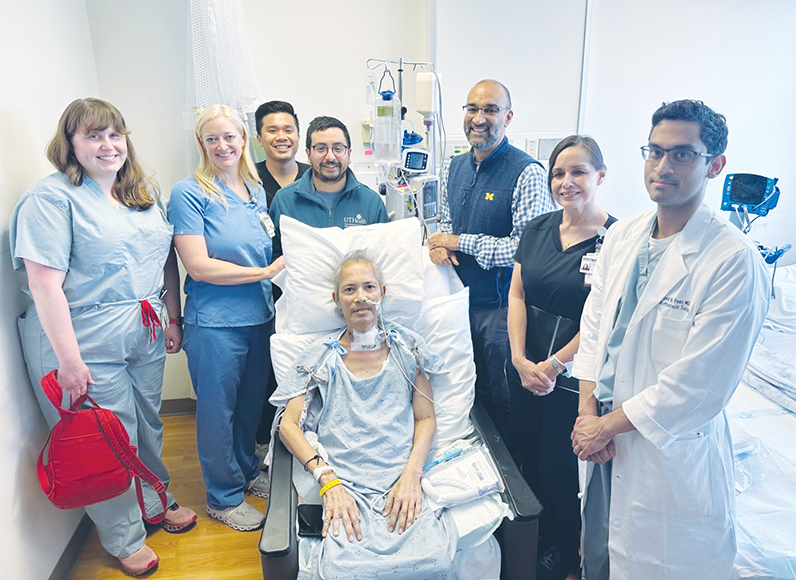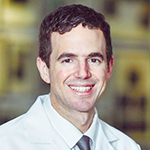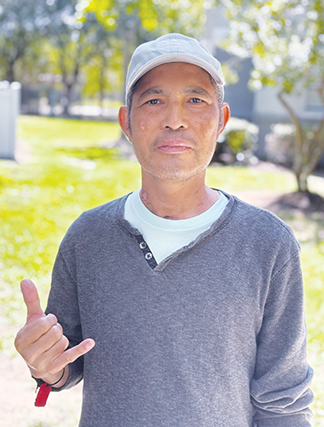
When Dr. Gabriel Loor and other doctors at Baylor St. Luke's Medical Center in Houston heard about a man from Honolulu who couldn't get the double lung transplant he needed, they figured out how to help.

A health care team in Hawaii had been unable to find a hospital willing to take 54-year-old Benjamin Calimbas, mostly due to insurance issues and his dire condition.
When Calimbas was strong enough for the trip, Baylor St. Luke's arranged to transport him 4,000 miles to Texas on a medical flight. During the eight-hour flight, he was attached to an ECMO machine, which provided support to his heart and lungs.
"For somebody traveling so far, on a device where anything could happen during that transportation, was absolutely crazy," said Loor, who performed the surgery on Calimbas. "For them to put all of their trust in our system, to take that risk, was remarkable."
Loor is surgical director of lung transplantation at Baylor St. Luke's, where about 70 lung transplants take place every year. The hospital is part of St. Luke's Health System, a subsidiary of CommonSpirit Health. Most of the patients who get transplants are from Texas or contiguous states, he said.
Healthy, then suddenly frail
Calimbas had been a healthy father of two when he began having breathing problems in February 2023. He developed pneumonia, which progressed to respiratory failure that severely damaged both lungs. Before long, he could no longer breathe on his own. His care team at Queen's Medical Center in Honolulu intubated him and then put him on ECMO. They determined he needed a double lung transplant.
In addition to respiratory failure, Calimbas was suffering from kidney failure, infection, gastrointestinal bleeding, and physical deconditioning, Loor said. The longer he stayed on the ECMO device, the more risk he had of stroke, bleeding, and more complications.
The doctors at Baylor St. Luke's heard about the case through an intensivist who knew a thoracic surgeon at the hospital in Hawaii. They started informal talks and eventually determined they could treat him. He flew to Houston in April.
Calimbas spent the first month or so in Houston in late spring 2023 rebuilding his strength.
"Our physical therapy teams were working around the clock on the weekends, trying to get him strong enough to be able to tolerate any kind of surgery," Loor said. "Once we had the confidence that we thought he could get through, we went ahead and presented him to the committee, and he was approved for a bilateral lung transplant."
The committee is the multidisciplinary transplant review board who reviews the status of patients on waiting lists and determines whether matches are appropriate.
Immediate turnaround
Loor said the surgery, which took place June 20, was challenging because of inflammation and scar tissue from the pneumonia, but the transplant otherwise went smoothly. The surgery itself took about six hours, with eight hours total in the operating room. It involved a large team including an operative assistant, trainee, nurses, perfusionists and anesthesiologists.
Loor said the new lungs made a dramatic difference for Calimbas. "It was almost like changing a battery," the surgeon said. "Once he had that, he was up, he was sitting in a chair, then walking."

Within a couple weeks, Calimbas was in a room on a regular floor, rehabilitating and getting ready to go home. He was discharged from the hospital to rehab in late July, and eventually flew home and is doing well, his family reports.
His son, Russell, had been shocked by his father's dramatic downturn and was elated by his father's recovery.
"I work as a nurse in the ER back home at Queen's Medical and I am used to seeing sick people every day but when it came to seeing my own dad in such a vegetative state, it really affected me," he said in an interview with Baylor St. Luke's. "Now that he is out of the hospital, I'm really happy that we can go back to the way life was. My dad really missed home, especially his dog, Louie."
'A calculated risk'
Loor said that even though Calimbas was very sick, he was very motivated, as were his family members, who stayed by his bedside. Calimbas and his family also were compliant and positive, doing what was asked by the medical team, said Loor. "Family support is so important for this to be successful," he said.
He's happy the hospital decided to take on the case.
"At the end of the day, it was our willingness to take the risk," he said. "And that's a calculated risk. There are patients that we have turned down and other people have done the case and successfully, so it's not like we're the be-all end-all. But in this case, it was really just our willingness to take the risk, and the risk meaning that it could be a bad outcome.
"I had the privilege to be on call that night and do it, so that was awesome," he said.
Calimbas is grateful for the second chance.
"I can barely remember how I got to Houston," he told the hospital. "I am very thankful to Baylor St. Luke's Medical Center for accepting me as their patient and giving me another chance to breathe again."
